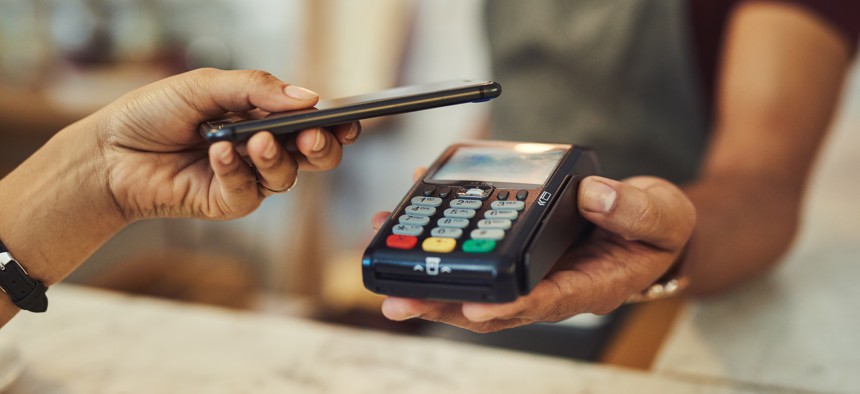Utah readies mobile driver’s license rollout

mapodile/Getty Images
While the technology for the mDL is ready, the challenge is creating an ecosystem of partners who accept the digital ID.
Utah residents will soon be able to get a digitally signed mobile driver’s license (mDL) through the state’s Driver License Division (DLD).
The agency is in the final stages of a pilot test that started in 2021 and involves over 4,000 users of the mDL and five reliant parties, or partner entities, that can digitally verify the licenses, including state-owned liquor stores and the Utah Highway Patrol. The goal, said Ryan Williams, IT/quality assurance manager at DLD, is to announce the availability of the mDL app in Android and Apple app stores in September.
Whereas most people think of a digital license as a photo of their physical card on their smartphone, the mDL has been cryptographically transferred and digitally signed by DLD, the authorizing agency. What’s more, it gives license holders more control over their data because they share only the information the verifying entity needs, rather than all of the personally identifiable information – photo, address, birth date, physical description, license number – that physical licenses have.
For instance, when pilot participants present their mDLs at Harmons Grocery in Utah for age-based alcohol purchases, they can choose to just share their age. That kind of control is a huge draw for many Utah residents, based on feedback Williams said DLD has received.
Educating people about how each data element on an mDL is encrypted and explaining that attempts to change that data will result in a failed verification has been a major aspect of the pilot, Williams said.
“People are surprised about how the transaction happens, how it’s not me showing you my phone and you’re looking at a picture of my license, but it’s actually the encrypted handshake that the phone and the reliant parties make,” he said. “We like to say, ‘It’s not what you show, it’s what you verify.’"
Other feedback about mDLs is more of a pain point, he added: Residents want more places where they can use them, particularly for law enforcement if they, say, get pulled over for a traffic violation, and to fly on an airplane.
“It’s not a flash pass; it’s not something I can show. Somebody has to have a verifier on the other side,” Williams said, which is a complicating factor because the state has hundreds of law enforcement offices that would need to make changes to their technology and operations. “We found out that some law enforcement agencies – many of them, in fact, like the highway patrol – did not have [smart]phones when we launched this program. They got phones during the time when we were working on this, so now each trooper does have a phone so they can have the app on it.”
“Beyond that, as soon as I cross a state line, I need all of those law enforcement agencies to be onboard and have verifiers,” he added. As a result, Williams said it’s unlikely that people will be able to get rid of their physical licenses anytime soon.
More progress has been made with the Transportation Security Administration, which handles screenings at airports, seaports and railways. In March, the agency shared that through the Next Generation Identity: Mobile Driver’s License project, it’s working with the National Institute of Standards and Technology and nongovernmental organizations to develop a framework for mDL use by the Homeland Security Department and its components, including TSA.
That same month, TSA said passengers at Phoenix, Arizona, Sky Harbor International Airport could add a digital version of their license or ID to their Apple Wallet for TSA identity validation. Williams hinted that Utah has made a similar agreement: “We are further along with TSA and hoping to make an announcement very soon, probably within the next month, that we will be joining their pilot.”
Along with TSA, Apple is working with several other states, including Connecticut, Georgia, Iowa, Kentucky, Maryland and Oklahoma to allow for the use of digital licenses.
The challenge now is creating an ecosystem for mDLs. Through its pilot – the only one by a state to use reliant parties, Williams said – Utah has already brought onboard the Utah Community Credit Union, pharmacies and the America First Credit Union (AFCU), which joined in August. Twenty to 30 businesses and entities such as the Salt Lake County Library have inquired this summer about joining.
The demand is there, but “each business has their own need for the reasons they can take an ID, and therefore their process is the toughest thing to work around,” Williams said.
For instance, a Highway Patrol officer still needs to see all of the information on an mDL, while AFCU, which uses iOS tools to verify customers, needs only the data typical of bank teller interactions.
“Every reliant party has a different technology, but the beauty of the ISO standard is that it will allow anybody who implements using the ISO standard, whether it’s a mobile driver’s license or a verification, to read it, to consume it,” said Alex Kambanis, managing director of GET Group, which created the ISO 18013-5-compliant app that puts a license on a smartphone and tools for verification.
Other states that offer mDLs include Arizona, Colorado, Delaware, Florida, Louisiana and Oklahoma.
Stephanie Kanowitz is a freelance writer based in northern Virginia.





